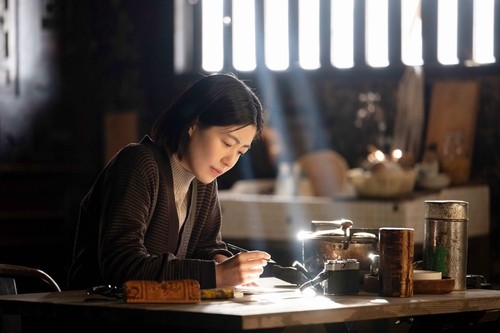“Another Season Shaped by Sim Eun-kyung”
The scene felt immediate.
In August 2025, the nights in Locarno, Switzerland, were unusually calm.
At the 78th Locarno International Film Festival, the Japanese film "Tabi to Hibi" (English title: "Journeys and Days") took the top prize in the international competition, the Golden Leopard.
Lead actor Sim Eun‑kyung delivered her acceptance remarks in Korean and thanked the director and crew for their long journey together.
The images tell the story.
For a moment, the lights on stage seemed to shine a little brighter with Sim Eun‑kyung’s words.
Small Steps, Big Ripples
The film began quietly.
"Tabi to Hibi" was directed by Sho Miyake and is adapted from a manga by Yoshiharu Tsuge.
The screenplay follows a character named Yi (a writer) who, during a snowy trip, meets a guesthouse owner and undergoes subtle inner change. The film favors mood and small gestures over plot fireworks.
Critics and the jury seemed moved by nuance.
Reviews and jury comments point to the film’s delicate emotional arc and the actor’s finely tuned performance as decisive factors in the award.
Meanwhile, the film’s restrained rhythm and spare aesthetic fit the kind of work Locarno often highlights.
Why Did Locarno Choose This Film?
The festival’s judgment is always nuanced.
Locarno has a reputation for rewarding emotional depth and formal experimentation (the festival is known for supporting emerging directors and art-house work).
"Tabi to Hibi" prioritizes interior reflection over conventional storytelling, a posture that likely resonated with international jurors.
Look at the details.
Sho Miyake’s direction uses sound, landscape, and silence to reveal changes in the characters with great subtlety.
Sim Eun‑kyung conveys anxiety and solace through tiny shifts in expression and breath, even when speaking Korean in a Japanese-language setting. On the other hand, the film’s faithful translation of the manga’s mood to screen likely strengthened the jury’s assessment of its artistic integrity.
A New Chapter in Korea–Japan Cultural Exchange
This is a hopeful reading.
A Korean actor starring in a Japanese film that wins Locarno’s top prize signals deeper collaboration between the two film industries.
Sim Eun‑kyung’s achievement expands her international profile and, by extension, highlights the competitiveness of Asian talent on the world stage.
Furthermore, this outcome can be read as evidence of the region’s artistic diversity and growing presence at major festivals.
Concrete effects are likely.
First, the actor’s brand value will grow. Her performance may open doors to new co-productions with directors and producers abroad.
Second, the award shines a spotlight on the source manga and on Miyake’s filmmaking. That attention can increase critical interest and improve distribution prospects for both the film and related works.
There is also a social and cultural dimension.
Even amid political tensions between Korea and Japan, cultural exchange at a people-to-people level can broaden mutual understanding. However, art does not operate in a political vacuum, and cultural collaboration may also become entangled with historical sensitivities. Still, art-based ties sometimes build different layers of trust than formal diplomacy does.
Wider Impact on Asian Cinema
Voices of caution exist.
Some worry that more Korean actors appearing in Japanese films could unbalance domestic production ecosystems if talent increasingly works abroad. Fans and industry observers may question whether such trends drain local projects of star power. This concern is not merely protectionism; it reflects real questions about industrial balance and sustainable careers.
Political sensitivities matter.
Korea and Japan share a fraught historical and political relationship. On the other hand, cultural events involving both countries can quickly become politicized. Indeed, a minority of online reactions framed the award within historical context and responded negatively. Those responses cannot be ignored when evaluating the award’s reception.
Economic doubts remain.
Winning at an international festival does not guarantee box-office success at home. Art-house acclaim often does not translate directly into mass-market returns, so investors may see festival awards as insufficient proof of commercial viability. Therefore, to create lasting economic benefit, this accolade will need to be paired with smart distribution and marketing strategies.
A Question for Audiences
Finally, a question for viewers.
Will this win trigger lasting change, or will it remain a moment of celebration without broader consequences?
Some argue that Sim Eun‑kyung’s performance and the film’s recognition mark a turning point for Korea–Japan collaboration in cinema. On the other hand, whether that turning point leads to wider cultural understanding or renewed debate will depend on audience reactions and industry choices in the months ahead.
To summarize.
The Golden Leopard acknowledges the film’s artistic achievement and celebrates the long work of the cast and crew. At the same time, the win sits at the intersection of cultural, political, and industrial factors, which invites multiple interpretations and follow-up questions.
Sim Eun‑kyung's lead role in the Japanese film "Tabi to Hibi" won the Golden Leopard at the 78th Locarno International Film Festival in August 2025.
The award recognizes the film’s artistic merit and the actor’s delicate performance, and it can be read as a symbolic moment for Korea–Japan film collaboration and the rising visibility of Asian cinema.
However, political sensitivities between the two countries and the gap between festival acclaim and commercial returns mean that distribution strategy and audience response will be key to determining this event’s long-term impact.
How do you interpret this win?